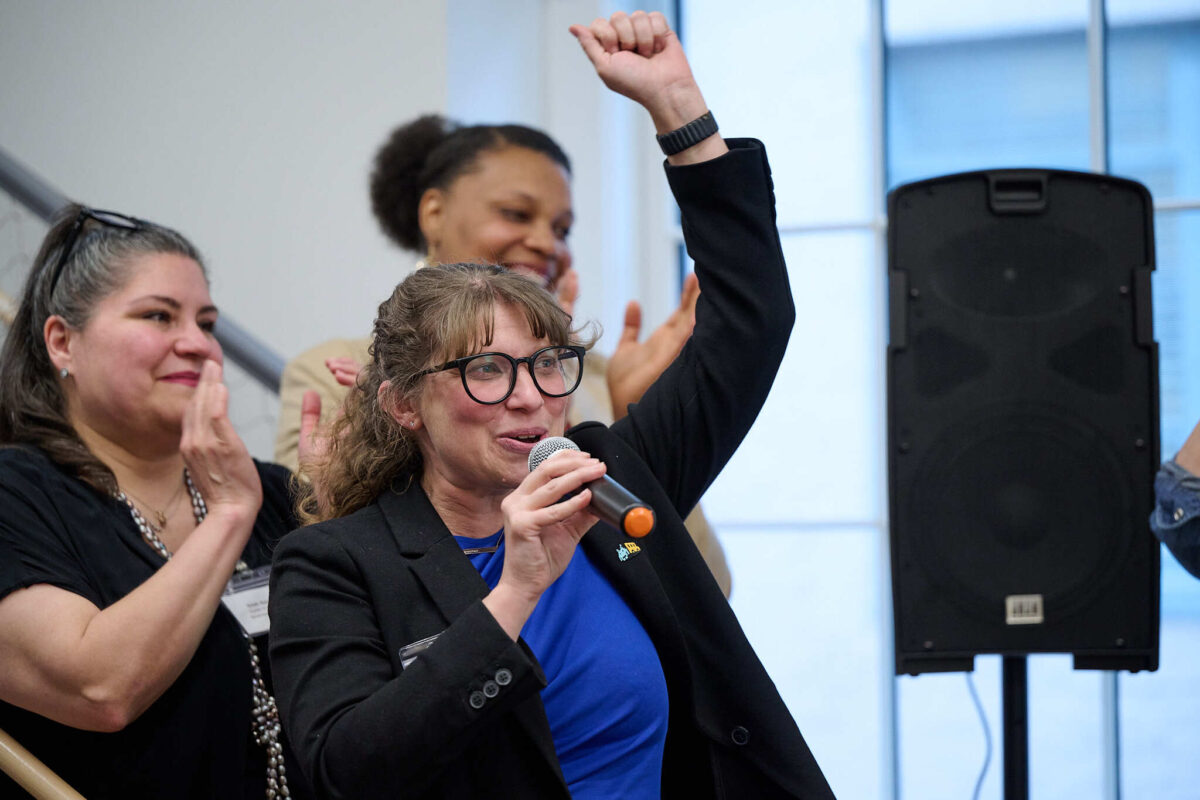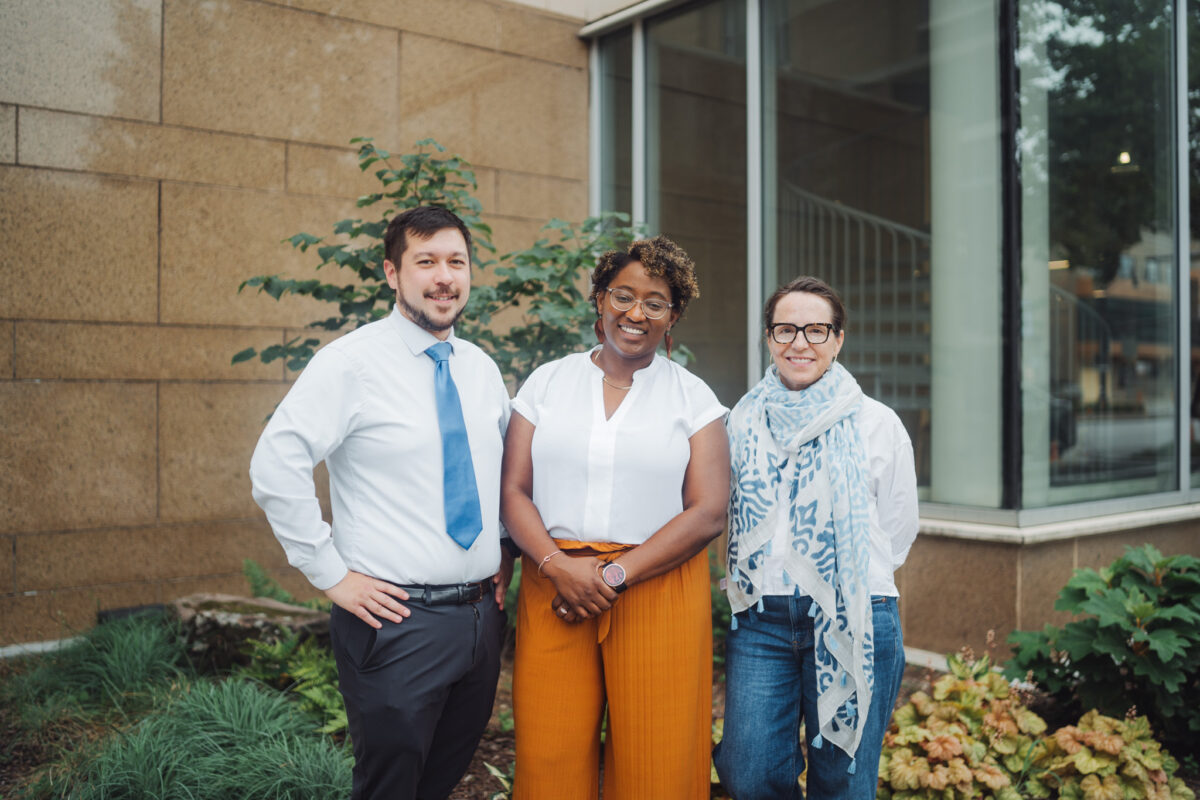In April, the Technical.ly team’s curiosity about the power of ChatGPT led to an exploration of Baltimore programs geared toward equipping job seekers with the resources and guidance needed to effectively prepare for roles in the tech industry. Code in the Schools was highlighted among ChatGPT’s responses.
Since 2013, the Baltimore nonprofit has been committed to advancing computer science education and empowering young individuals in the realm of technology. The organization celebrated its decennial at a celebration held at its offices on North Avenue back in March.
Earlier this month, the organization marked another significant milestone by announcing the stepping down of founding CEO Gretchen LeGrand. She passed the reins to the current COO, Dianne Conley, while also welcoming new co-executive directors Dianne Conley, Andrew Pham and Stephanie Alphee.
In an interview, Conley stated that this shift has been in the works for some time.
“Just over a year before our 10th-anniversary celebration in March, Gretchen shared her intention with the board and me to transition,” Conley said. “With four kids, including one entering high school, she wanted more time for motherhood.”
While a fresh perspective was cited as important for the reasons behind the shift, it was also made clear that LeGrand’s decade-long legacy with the coding program would still carry weight — at least for a little while.
“While stepping back, she remains integral, budgeted for consulting in the upcoming year,” Conley said. “Her insights will smooth transitions and uphold vital relationships within our tight-knit team.”
The tripartite leadership
While Conley is now ascending, the co-executive director and former COO has been pivotal since the organization’s early days. She first contributed as a board member and served as COO since 2016. She’s also joined by Pham and self-described “crafty techie” Alphee, who believed that the new model lets the three leaders draw on complementary skills.
“I’ll take this moment to mention that we each come from different parts of Code in the Schools, which aligns beautifully,” Alphee said. “Diane, with her tech industry background and numerous other strengths, brings valuable expertise to the table. Andrew, a computer science educator and the driving force behind the SEED School, is deeply involved in professionalizing school-day activities and creating tech pathways. As for me, my strong suit lies in out-of-school time, where I work on leveraging those hours beyond the regular school day. This turns them into hubs of learning, making education accessible to those who lack other means.”
“We envisioned a leadership team that could be an ideal fit for the organization,” Conley added. “This led us to consider the prospect of streamlining the structure, possibly eliminating some intermediate roles. This resonates with Stephanie’s earlier remarks about flattening the organization. While we are currently in the early stages of implementing this approach, the initial results show promising synergy and enthusiasm among the team members.”
Code in The Schools is not the only nonprofit organization in Baltimore looking to models of co-leadership. Impact Hub Baltimore, Station North Tool Library and The Farm Alliance of Baltimore all seek a similar flattening in their organizational models going forward.

Code in the Schools Executive Director Gretchen LeGrand addresses a crowd. (Courtesy photo)
This new leadership team aims to broaden Code in the Schools’ influence, as well as ensure that youth in Baltimore City can thrive in the digital age even beyond LeGrand’s departure. Pham, for example, highlighted the strategies for the organization’s flagship programs like Prodigy and CodeWorks, which recently concluded for the summer.
“It goes beyond the basic introduction to computer science; we’ve already achieved that over the course of a decade,” Pham said. “Our focus is on active engagement, hands-on experience within classrooms and professional settings alike. We strive to instill a pursuit of excellence. Our primary goal is to reshape the Baltimore tech ecosystem to reflect the city’s diverse demographics and embrace the full spectrum of experiences.”
Code In the Schools’ CodeWorks is a partnership with Baltimore City’s YouthWorks summer job program and will be one of the first organizations to pilot YouthWorks’ newly announced year-long model, with about 14 students who engaged with the five-week summer experience starting in October.
Join our growing Slack community
Join 5,000 tech professionals and entrepreneurs in our community Slack today!
Donate to the Journalism Fund
Your support powers our independent journalism. Unlike most business-media outlets, we don’t have a paywall. Instead, we count on your personal and organizational contributions.

Maryland firms score $5M to manufacture everything from soup to nanofiber

National AI safety group and CHIPS for America at risk with latest Trump administration firings

How women can succeed in male-dominated trades like robotics, according to one worker who’s done it



